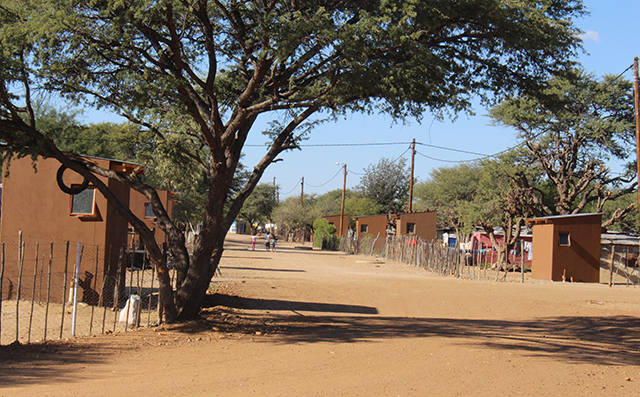IT IS 14h30 and Frieda Nembwaya is running around at her home trying to make pop corn and also pacify her youngest daughter, who is throwing a tantrum.
The 41-year-old has been living at the Omitara settlement in the Steinhaussen constituency, situated some 30 kilometres north of Gobabis with a population of more than 2 000 inhabitants, since 2007.
Nembwaya is one of the few residents who has made the most out of what government has done for the community of Omitara to make things work not only for herself but her 10 children as well.
Her spacious yard consists of two corrugated iron sheet structures, each divided into two rooms – with one functioning as a kitchen and spare room.
Right at the front of her yard is a newly constructed flush toilet with a shower. A few metres from it is a tuck shop which she intends to turn into a bakery in the near future.
Her toilet is one of the 320 facilities constructed under a government initiative to dissuade the community from using the bush when nature calls.
She greets The Namibian with a smile as we enter her yard, while one of her daughters hastens to attend to her sibling, who is still crying.
She provides the news crew chairs in the shade of the tuck shop structure, Nembwaya tells The Namibian how she fought for her family to have a better life, having worked only on a farm before coming to live at Omitara.
She also talks about how the government has made life more comfortable for the people of Omitara who now have access to essential services.
At first Nembwaya rented in somebody’s yard for some time until her entrepreneurial skills – selling traditional bread, snacks – and the timely introduction of the Basic Income Grant (BIG) pilot project around 2007, pushed her to buy her own erf.
While thanking God, Nembwaya says she makes up to N$500 per day through selling snacks and bread.
“With BIG we got another N$600 per month, and it went a long way,” says Nembwaya, adding that it contributed to the construction of her soon-to-be operational bakery.
Nembwaya says the money enabled her to apply for an erf, install water and electricity as well as start the construction of her tuck shop.
“I was fortunate because that money helped my family a lot. Some people say that giving people money will make them lazy, but I do not think that is true. I will soon open my bakery and even employ people,” she said.
Nembwaya also benefited from the Namibian-German Special Initiative Programme (NGSIP) under which she and 53 other residents of Omitara received five goats each.
The group was resettled at a 2 484 hectares farm Rosebank outside Gobabis under the government’s resettlement programme.
Nembwaya says she has since bought a ram which has made her goats multiply, and some cattle.
“I hired someone to look after my livestock that side. I could not live at the farm because I have children who attend school and that depends on me working so I can send money to them,” she says.
Of her 10 children, three attend the University of Namibia and Namibia University of Science and Technology in Windhoek.
Two of her daughters are in high school at Wennie du Plessis, Gobabis, while the other five stay with her at Omitara.
“I feel fortunate. I like being busy, and I teach my children to use their hands so that they do not have to depend on anyone. With little you can go far,” she says.
Other community members also benefited from the Basic Income Grant project, a programme run by the Lutheran Church between 2007 until in 2009.
All beneficiaries who were below the age of 60 got N$100 per month, which was later reduced to N$80 per month.
Community chairperson Max Hoxobeb and vice chairperson Lena Seibes expressed gratitude to the government for making life easier for the people.
“We are grateful to the government for what has been done for us, but the only thing we need to look into now is the issue of lack of jobs. Aquaculture must be brought back to create employment,” says Hoxobeb.
Stay informed with The Namibian – your source for credible journalism. Get in-depth reporting and opinions for
only N$85 a month. Invest in journalism, invest in democracy –
Subscribe Now!






